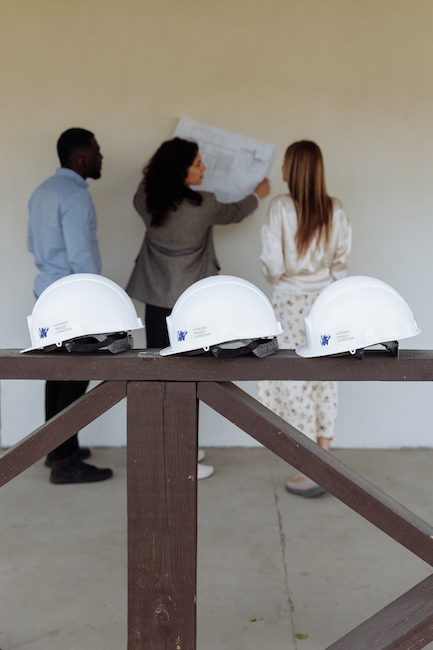Sexism in the construction industry. Is the concept real? Or overblown?
Women in construction have historically been perceived as having a harder time gaining respect in the industry than their male peers. With women comprising only 11% of the construction industry and 27% of architectural and engineering-related services, it’s easy to understand how that might be the case. But I think the majority of us would like to believe that as a society, we’ve reached the point where most people recognize women’s equality in the workplace. The question is, to what degree has this open mindset truly worked its way into the construction industry?
In recognition of Women in Construction Week 2022, we reached out to Wallace Design Collective’s contingent of female engineers and asked them to weigh on their experiences. These industry professionals deal with construction from the design side, routinely communicating with contractors and visiting job sites to inspect progress or offer technical expertise.
Here’s what they’ve experienced as female engineers in the construction industry:
When Kenna Chapin, PE, SE, FAEI, began her career as an architectural engineer, she would field calls from clients and contractors asking to speak to “her boss” or “the engineer,” assuming she was a secretary.As a young civil engineer, Nicole Watts, PE, CFM, learned early on to stand her ground as she endured catcalls and aggressive questioning on her job site visits. Sheila Butcher, PE, doesn't feel as though she’s experienced it professionally, but during her and her husband’s home building process, she says the contractor would constantly direct his questions to her husband…who would then turn to her for an answer.
But it’s 2022. Surely women don’t deal with these types of discrimination today…right?
During structural and roofing inspections, Brittany Johnson, PE, RRO, has been called “honey” and “sweetheart” and says that it’s usually followed up with condescending objections to her observed deviations. Maria Torres, EI, has noticed that the clients and contractors she has met on job sites have been exclusively male, and during these meetings, she’s generally been ignored ‒ not asked questions or given the opportunity to contribute, and in one case, not even acknowledged during the round of introductions. Mili Angier, PE, says she has managed site design projects where the contractors or clients routinely address questions to her male coworkers, despite the fact that she is the project manager and the expert on that job.
Survey says…it’s real.
But the general consensus is that the atmosphere is getting better and that sexism in the construction industry is not as common or severe as it once was.
Still, what can a female engineer or design professional do if she feels that she’s being disrespected or disregarded on construction sites? And how can new female graduates prepare for job site interactions in this male-dominated industry? We asked our engineers for their advice and compiled a list of six tips for female engineers in the field:
Be confident and assertive
A little confidence can go a long way in establishing respect. Think of confidence as 20% external bravado and 80% internal substance backing it up. Yes, you need to make sure you’re acknowledged, but also make sure that what you’re putting out there is more than just a facade. Prove why you’re the professional that deserves to be there and be heard.
Study up and be prepared for your site visit. Make sure you know the purpose of the inspection or meeting and are familiar with the appropriate plans and details. Before heading out, ask your co-workers as many questions as you need.Take the initiative to introduce yourself on site - don’t wait for someone to do it for you.If you run into an issue that you’re unsure of, don’t make up an answer or pass it off. Simply make a note and assure them you will find out and get them an answer via phone or email. Then, make sure you promptly follow up.Be prepared to defend why you think something is a deviation or why it should be done a certain way, but also be open to discussion. You might worry that listening to suggestions or challenges from contractors shows weakness. However, the opposite – being so assertive that you immediately dismiss any explanations or ideas – could actually imply that you’re not knowledgeable enough to competently discuss certain issues. Having confidence in your technical knowledge can allow you to feel comfortable hearing out a contractor and having a back and forth exchange. At the end of the day, it’s still your call, and not only will you have gained some valuable insights, but the contractor will also feel heard and likely view you as a team player.
Stay professional and keep a level head
If you are addressed inappropriately or feel demeaned, don’t rise to the bait. Letting emotions or stress get the best of you can adversely affect the situation and any future interactions. Stay calm, address it professionally, and then direct focus back to the business at hand.
If you feel disrespected, say so
Keeping a professional demeanor doesn’t mean you can’t call someone out for disrespect. Whether it’s being ignored, addressed as “honey,” or talked down to, respectfully let them know it won’t be tolerated. The other party may not even consciously realize what they’ve said or how their words or actions have come across, so addressing it and clearing the air right away can create a fresh start.
Find an advisor or champion
If you’re feeling routinely ignored or disrespected by certain contractors, clients, or other consultants, find someone in your company to whom you can express your frustrations. Preferably, it should be a supervisor who is familiar with your projects and contacts. They can be there for moral support, offer advice, and step in if necessary. Don’t feel like you have to be in it alone or be afraid to ask for help
Recognize that sexism in engineering and construction is the exception, not the norm. If you approach every job site expecting to be discriminated against based on your gender, you’ll end up viewing every interaction through that lens.
In reality, maybe a tense moment with a contractor might just be them having a bad day or perceiving you as young and inexperienced - not necessarily a female. Understand that cultural differences could also come into play. What may come off as disrespect, may actually just be some initial shock or surprise at meeting a female engineer.
True sexism in construction certainly exists, but it’s not the industry baseline. You can approach interactions with an open mind, while still being prepared to stand your ground.
Don't let one negative interaction ruin your confidence
Being on-site to see how designs come to life is such an important and exciting part of engineering and design. Letting a bad experience shake your self-confidence to the point where it adversely affects your interactions with contractors and job sites or leaves you avoiding site visits altogether means you could be missing out on valuable learning.
Mili says it best: “There will always be people whose opinions and behaviors you cannot change…[but] there are always ten times more people that believe in you.”
Know that the atmosphere for women in the construction industry is continually improving, and don’t let an isolated incident break your confidence or excitement.
A big thanks to our female engineers at Wallace Design Collective for their input and advice! See what they have to say about their favorite aspects of fieldwork and why it’s important for women (or anyone!) in engineering and construction to get out in the field.
Mili Angier, PE, Civil Engineer | Oklahoma City | 5+ years experience
“I love putting site plans together. My favorite part is seeing it built in person or seeing it on an OKC Talks post and knowing that I had a part in it.”
Sheila Butcher, PE, Structural Engineer | Denver | 20+ years experience
“There are so many aspects of fieldwork, from inspecting damage to scoping out existing buildings, but my favorite will always be observations of buildings under construction. I love seeing a building come to life!”
Kenna Chapin, PE, SE, FAEI, Structural Engineer | Tulsa | 30+ years experience
“It is good to go out to the job sites to see how things are constructed. To have a better understanding of how drawings are interpreted. I am usually always amazed when I have worked so hard on making something work and how much smaller in scale it appears during construction.”
Brittany Johnson, PE, RRO, Structural Engineer and Roof Consultant | Denver | 10+ years experience
“Getting away from the desk!! Nice to not stare at a computer all day. I also like seeing construction in action. Getting to see that side can help develop an engineer's understanding of the entire process, which makes for better designs and less RFIs on future jobs. This is true for scope style visits too, as you will see real-time examples of completed details and potentially successful methods of retrofitting.”
Christian Jump, PE, Structural Engineer | Oklahoma City | 5+ years experience
“Anything that gets me outside on a nice day is my favorite type of work! I think my favorite aspect of fieldwork is verifying the safety of buildings. It makes me feel good when I can see and report that things are built correctly.”
Maria Torres, EI, Civil Engineer | Tulsa | 4+ years experience
“I love getting outside! More importantly, getting out in the field helps us as designers gain real-world knowledge about our industry. We learn construction processes and we see design aspects that work well and those that really don't. It helps us become better designers and become more attuned to what the people using our plans need from them.”
Nicole Watts, PE, CFM, Civil Engineer | Tulsa | 20+ years experience
“I love working out problems with contractors in the field. Contractors have so much knowledge and you can learn a lot from them. They're the ones trying to build in the field what we draw in our plans - and many times their real-life experience and knowledge can help us do things better and solve problems together.”



There are no comments.